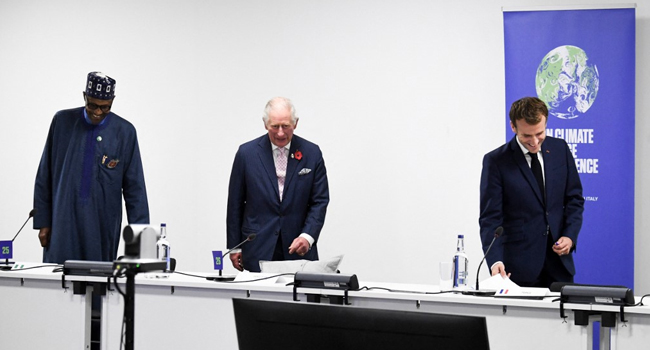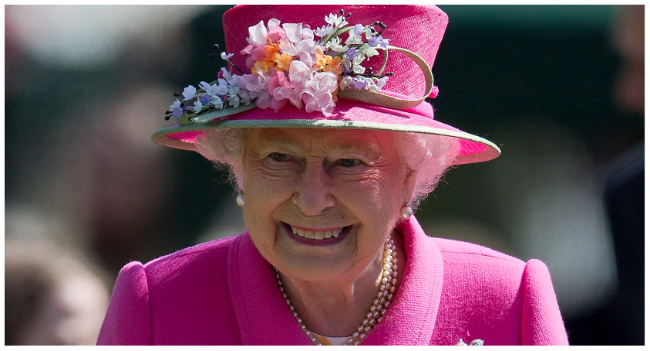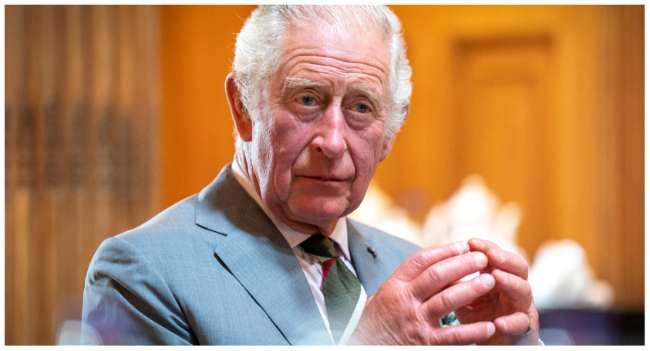
President Muhammadu Buhari has expressed optimism about Africa’s ambition to restore over 100 million hectares of the degraded landscape for productive agriculture.
According to a statement by his spokesman, Garba Shehu, the President said this on Monday in Glasgow, Scotland at the Climate Change Summit, COP 26, side event on the Great Green Wall (GGW).
The event tagged, “Accelerating land restoration in Africa, the case of the Great Green Wall initiative,” was co-hosted by French President Emmanuel Macron, the Prince of Wales, and Mauritanian President Mohamed Ould Ghazouani.
In his remarks, President Buhari said it was noteworthy that the meeting was tailored towards ameliorating the problems of land degradation, desertification, depletion of the forest ecosystems, and biodiversity in Africa.
“With all hands on deck and concerted efforts at land restoration by African leaders, I am optimistic that Africa’s ambition of restoring over 100million hectares of the degraded landscape for productive agriculture is achievable,” he was quoted as saying in the statement.
President Buhari added that Nigeria would soon assume the leadership of the Conference of Heads of State and the Government of the Pan African Agency of the Great Green Wall.
“Nigeria pledges her unalloyed commitment to expanding the achievements of the GGW programme in Africa from the enviable status attained under the leadership of His Excellency, Mohamed Ould Ghazouani, and President of the Islamic Republic of Mauritania.
“Together we commit to the transformative process of restoring the African degraded landscape and ultimately the continent’s environment,” he added.

The President commended the international partners for bringing environmental issues in Africa to the limelight, describing the Biodiversity Summit as a direct response to the request for support by African leaders to the global communities on addressing Africa’s environmental challenges.
“Since the pledges by the financial partners, the United Nations Convention to Combat Desertification has continued to give technical backstopping to the Pan African Agency of the Great Green Wall through the establishment of Great Green Wall Accelerator for the 2021- 2030 Decennial Priority Investment Plan for the Great Green Wall programme,” he told the meeting.
“This is to fast-track the implementation process with the prime purpose of translating the pledged financial resources of $19.681 billion into hectares of land restoration and other livelihood improvements at various country levels.”
Highlighting Nigeria’s role in actualising the land restoration initiative, President Buhari said the country participated in drafting and harmonising the Results Framework for the Accelerator with five cardinal pillars to address the 2021- 2030 Decennial Priority Investment Plan ambition of the GGW.
The five cardinal pillars, according to him, include the restoration of 100 million hectares of degraded land, sequestration of 250 million tonnes of carbon, creation of 10 million green jobs, resilient economic development in the various member states, as well as capacity strengthening and development.
Nigeria is part of the 193 countries that have ratified the UN Convention to Combat Desertification.
The goal of the convention is to combat desertification and mitigate the effects of drought in countries experiencing serious drought and/or desertification, particularly in Africa, through effective action at all levels, supported by international cooperation and partnership arrangements.




